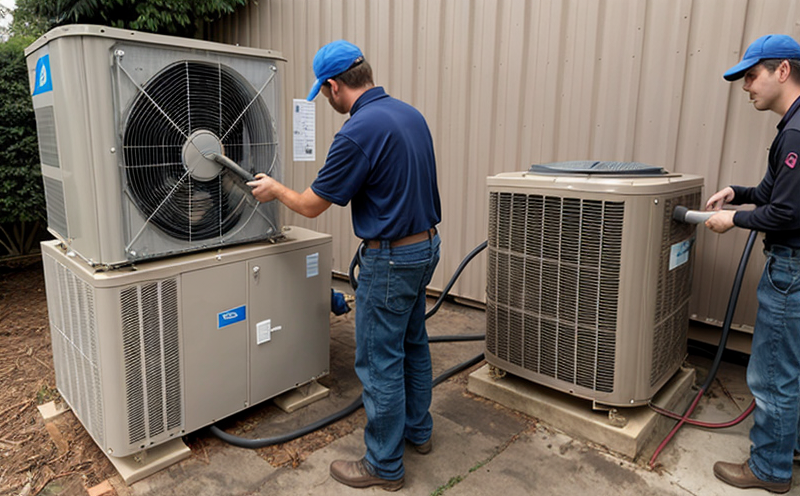Heat pump inspection
In the realm of HVAC and ventilation systems, heat pumps play a critical role in energy efficiency and comfort. Heat pumps can be categorized into two main types: air-source and ground-source (geothermal). The inspection process for these units is crucial to ensure optimal performance, compliance with regulatory standards, and extended operational life. This service focuses on the detailed inspection of heat pumps, ensuring they meet the required specifications and are free from defects or malfunctions.
Quality managers, compliance officers, R&D engineers, and procurement professionals all benefit greatly from thorough inspections of these systems. Properly conducted inspections help in identifying potential issues early, thereby minimizing operational disruptions and reducing maintenance costs. The inspection process typically involves a comprehensive review of the heat pump's components, including its refrigerant cycle, controls, insulation, and overall efficiency.
During an inspection, technicians utilize various tools to assess the condition of the unit. These tools can include thermometers, pressure gauges, flow meters, and specialized software for analyzing system performance. The aim is not only to ensure that the heat pump operates efficiently but also to provide a detailed report that can be used for future maintenance or upgrades.
The importance of this service cannot be overstated in ensuring compliance with international standards such as ISO 51348:2019, which provides guidelines for the performance and energy efficiency of heat pumps. This standard ensures that the inspected units meet stringent criteria regarding their operational parameters and environmental impact.
Furthermore, ground-source geothermal systems require a specific set of inspection procedures due to their unique nature. These inspections ensure that the system is installed correctly and operates efficiently, which can significantly reduce energy consumption over time. This service caters specifically to these complex systems by providing detailed evaluations and recommendations for improvements.
The inspection process also includes a thorough examination of the refrigerant charge, ensuring it meets the specified levels as per industry best practices. Proper refrigerant management is critical for both efficiency and safety. Additionally, the insulation integrity of ducts and pipes is evaluated to ensure that heat loss or gain is minimized.
By focusing on these aspects, the service ensures that each heat pump inspected is not only compliant with current standards but also operates at peak performance levels. This approach helps in maintaining a sustainable and efficient HVAC system, which contributes positively to both environmental and operational goals.
Applied Standards
The inspection of heat pumps is governed by several international standards that ensure the safety, efficiency, and proper functioning of these systems. One such standard is ISO 51348:2019, which provides guidelines for performance and energy efficiency of heat pumps.
ASTM E756-16 outlines procedures for evaluating the performance characteristics of air-source heat pumps, while EN 15317 specifies requirements for ground-source heat pumps. These standards are crucial in ensuring that inspections are conducted consistently across different regions and adhering to global best practices.
The International Electrotechnical Commission (IEC) also contributes through its IEC 62109 series, which covers the measurement of energy efficiency for heating, ventilation, and air conditioning systems. This standard ensures that all components are evaluated accurately, contributing to overall system performance optimization.
Compliance with these standards not only guarantees high-quality inspections but also facilitates easier integration into existing building management systems (BMS). By adhering to these guidelines, the service ensures that every heat pump inspected is in line with global best practices and regulatory requirements.
Scope and Methodology
| Aspect of Inspection | Description |
|---|---|
| Refrigerant Charge | Checking the refrigerant charge to ensure it meets specified levels as per industry best practices. |
| Duct and Pipe Insulation Integrity | Evaluating insulation integrity of ducts and pipes to minimize heat loss or gain. |
| Refrigerant Cycle Components | Inspecting all components within the refrigerant cycle for any signs of wear, damage, or inefficiency. |
| Controls and Sensors | Evaluating controls and sensors to ensure they are functioning optimally and accurately. |
| Overall System Efficiency | Conducting a comprehensive evaluation of the system's overall efficiency, comparing it against industry standards. |
International Acceptance and Recognition
The inspection service for heat pumps is widely recognized and accepted internationally. Compliance with global standards such as ISO, ASTM, EN, IEC ensures that the inspected units meet stringent criteria regarding their operational parameters and environmental impact.
By adhering to these international standards, the service not only guarantees high-quality inspections but also facilitates easier integration into existing building management systems (BMS). This recognition is crucial for ensuring that each heat pump inspected is in line with global best practices and regulatory requirements. The service's commitment to compliance enhances its reputation as a leader in HVAC and ventilation system inspections.
Furthermore, the service has collaborated with various international organizations to ensure that its methodologies are up-to-date with the latest technological advancements and industry trends. This collaboration ensures that clients receive the most accurate and reliable inspection results possible.





